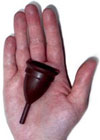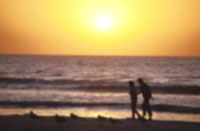Hey there, Umbra!
I have a kind of gross-yet-pressing question for you: Are sanitary products (pads, etc.) environmentally friendly? I would think no, but what do you say? And what can I do about it?
Thanks,
Jessica
Telford, Tenn.
Hey there, dearest Jessica,

How is it possible that we live in a country where diapers are table conversation and menstruation is considered gross? But no worries, there are many nice flowery euphemisms for us to wield while treading gently around this delicate topic. Environmentally, there are two issues here: First, what are the impacts of tampon and pad production, and second, what are the impacts of tampon and pad disposal?
What we have here are small, popular disposable products, and generally speaking, the environmental impact of small objects is not worth fretting over (electronics being an exception). Even if we had a complete data analysis of the waste and pollution implications of manufacturing tampons and pads, you ladies in the throes of womanhood know full well that there are other important factors at play in “sanitary product” choice, such as convenience, price, and comfort. Not to mention sanitary-ness, whatever that might be.
Even if you do want to reduce your contribution to this minor environmental woe, there is a shortage of options in the moon-mama market. If tampons are bad for the environment in some way (for example, through the chlorination of rayon and cotton during manufacturing), what can you do instead? Menstrual huts have never really taken off in Western culture, although I think this is a business idea waiting to happen. What we do have are practically secret, underground products disseminated via natural food stores and word of mouth.
“Natural” tampons, which are non-chlorinated and/or made from all-organic cotton, reduce the production impacts of sanitary products but continue the waste problem. (The U.S. Food and Drug Administration denies all the nasty rumors about dioxin, cancer, asbestos, and tampons, by the by, but many people remain concerned about the effects of lifelong exposure to the chemicals in sanitary products.) There are reusable, recycled cotton pads, which will cut down on disposal but raise the water bill. You could pull a Martha S. and sew your own pads out of old t-shirts, but don’t sell them to anyone else; it’s been repeatedly proven that folks hate successful businesswomen. Some people use natural sponges, torn from the ocean floor and sterilized. These have the benefit of being somewhat reusable and the drawback of … being torn from the ocean floor. Another generally unavailable option, used mostly for early abortion in the U.S., is menstrual extraction.

The Keeper.
Yes, I realize that none of these alternatives may sound enticing. But wait! You know I always try to give you the benefit of my long experience — in this case, my experience as a lady — and this lady is here to tell you about the Keeper, the very best of the secret, underground, word-of-mouth products. The Keeper is a rubber “menstrual cup” the size and shape of an egg cup. When folded and inserted, it opens and rests on the pelvic floor muscles. It collects menstrual blood rather than absorbing it, and is emptied periodically, depending on your own personal righteous womanhood. Let me testify, with glee, that I paid $35 for my Keeper in 1992. Other than sundry emergency supplies and several pounds of ibuprofen, that $35 is the sum total of my sanitary-product spending in the last decade.

Obviously, the Keeper is not for every woman, but only one woman in my extended circle of Keeper experimenters ever chose to discard hers and return to tampons. If you think the Keeper may be for you, I encourage you to investigate this low-cost, low-impact option. It’s not any “grosser” than what we’ve all been doing since the tender age of 12, to be printably vague. It is a sanitary, environmentally friendly method compatible with white pants, volleyball games, and soft music wafting in the background while you run in slow motion on the beach.
Delicately,
Umbra


